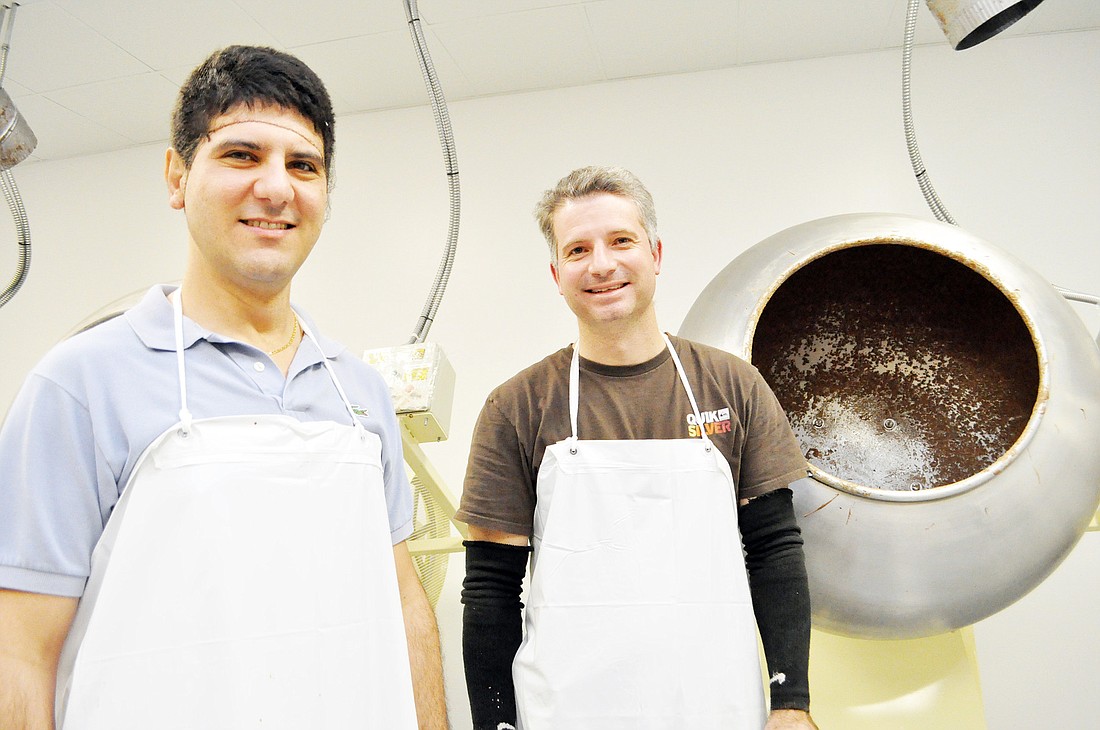- November 23, 2024
-
-
Loading

Loading

Mario Sica and Jose Iorio opened the NatureFood chocolate factory in January, in Hargrove Grade.
Mario Sica, of NatureFood chocolate factory in Hargrove Grade, has a strong Venezuelan accent. He wears a hair net and apron. And he translates for his brother-in-law/business partner, Jose Iorio, who stands beside him nodding and commenting in Spanish.
“Soon after (we) came here to the States, (we) knew someday (we) wanted to open a business,” Sica said, sitting behind a desk in a front room of his factory, breathing in the scent of chocolates mixing and melting somewhere in the back.
A former pharmaceutical equipment technician, Sica was hired by an Italian drug company 15 years ago to tour the United States, installing capsule-filling machines and leading training sessions.
But today, he has traded capsules for candy. Sica and Iorio’s 3,300-square-foot factory is filled with coating pans, refiners and packing lines, with operations modeled after a Venezuelan sister company launched by friend Antonio Santangelo, who traveled to the U.S. for about a week to help Sica and Iorio get started.
Santangelo and another Venezuelan each also have a share in NatureFood.
It took about a year, and a little help from the Palm Coast Business Assistance Center, but NatureFood is officially making cholesterol- and gluten-free chocolates in Palm Coast. They make no-sugar dark and reduced-sugar milk chocolates, which they then coat over raisins, nuts and coffee beans.
Some of their products can also already be found in local shops, such as The Sweets Boutique, and are currently being marketing to larger chains, such as Publix, Walmart and Target.
It’s a model BAC Area Manager Joe Roy praises for its “nontraditional economic impacts.”
“We don’t capture the full economic impact within the BAC reporting structure,” Roy said. “NatureFood hired a Palm Coast general contractor, is building machines in Bunnell, has a graphic designer in Palm Coast and works with a Palm Coast consultant. … To me, this is an example of what can happen when we grow from within.”
Although the company currently consists of just Sica and Iorio, working 16-hour days, Monday through Sunday, NatureFood plans to add another 10 to 12 workers.
“It depends when the market starts picking up,” Sica said. “We’re going to start with one, and then maybe two, three. Our goal is to add 12 within a year.”
Each 1,200-pound batch of chocolate takes Sica and Iorio three days to finish. First, ingredients are weighed and cut before being put into a refiner and mixed for about 10 hours until smooth. After that, each nut and bean is manually coated in chocolate.
The fruits of their labor can be found lining Sica’s desk in jars with plain labels: “Raisin Milk,” “Coffee Dark,” “Almond Milk.” Visit and they might twist open caps and urge you to test a bean or nut.
“Is it too strong?” they’ll ask. “Your honest opinion.”
In an already-cramped global chocolate market, Sica and Iorio feel they found a niche by appealing to the health-conscious candy consumer. In addition to being made with skim milk, they believe, their chocolate stands out among national brands’ sugar-free varieties because it’s made with a starch-based sweetening substitute instead of sugar alcohols, which can produce laxative effects.
Still, even with a strong product, and an established Venezuelan model to follow, building a company from scratch isn’t easy.
“Sometimes our language is limited, and this is the first time (we’re) going into business,” Sica said. “It is just a learning curve, up and down. It is a challenge.”
Within a month, NatureFood will receive its packaging materials. Sica and Iorio hope to have candy on shelves by mid-March.
For more, contact [email protected].